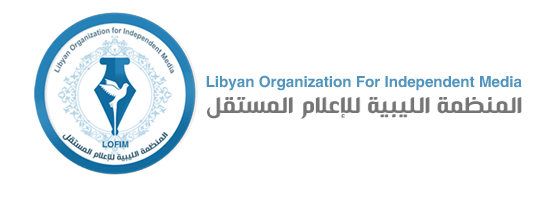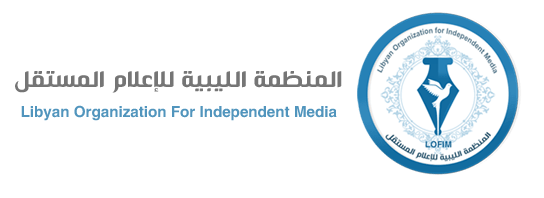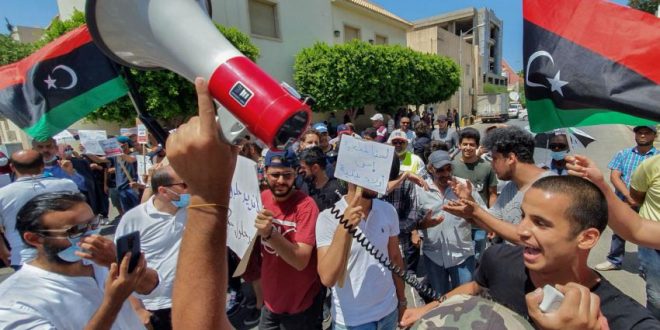CIHRS and the Libya Platform Libya: National authorities and international community must urgently protect demonstrators and freedom of expression in Libya
Repressing fundamental freedoms will only serve to reinforce crisis of legitimacy on both sides
31st August 2020
The population in Libya has suffered greatly from the armed conflict under way since 2014. Essential public services and infrastructure have either suffered damage during indiscriminate military attacks, or have been incapacitated as a way to further political goals within the conflict. On both sides, Libyans and non-Libyans suffer from repeated water and electricity cuts, poor medical services and an acute financial crisis, in the midst of a growing pandemic.
Peaceful protests, responding to calls for demonstrations that have appeared on social media since early August 2020, started on 23 August in Sebha, Tripoli, and Benghazi; similar protests followed in Sirte, Misrata, Zawiya, Ghat, Aljmail, and Obary. Demonstrators throughout Libya have advanced demands for the right to a dignified life, the provision of basic services, and an end to rampant corruption.
In spite of their political and military rivalry, both Eastern and Western-based authorities have taken similarly repressive action in response to the demonstrations, cracking down on demonstrators, and targeting journalists and peaceful activists.
Six demonstrators were abducted in Tripoli, no less than eighty in Sirte, and five in Benghazi. Public squares have been closed with heavy artillery pieces to prevent demonstrations, such as in Benghazi on August 23, and in Tripoli since 28 August. Demonstration permits have been denied in Tripoli since August 23 and a four-day long curfew was imposed on August 26. Excessive violence has been used against demonstrators, including gunfire, leading to one death in Tripoli and one in Sirte, and multiple injuries. In Sirte, all internet and communication services in the city were cut, and anyone found in possession of any equipment that could be used to install satellite communication or internet networks can be arrested. Dissenting voices and demonstrators in Tripoli and Benghazi have also been targeted online by hate speech and accusations of national treason, including from public figures.
This comes within a context in which journalists, peaceful activists and demonstrators are systematically and arbitrarily prosecuted, notably before military tribunals in eastern Libya. According to the Libyan Organization for Independent Media (LOFIM), at least 35 civilians have been prosecuted in military courts since 2015, among them photojournalist Ismail Bouzriba al-Zoui[1].
CIHRS and the Libya Platform call on the Office of the High Commissioner for Human Rights (OHCHR), UN Special Procedures, the African Commission, and the European Union (EU) to urgently press all Libyan authorities to release detainees, investigate the targeting of demonstrators and activists, and guarantee the rights of peaceful assembly and expression.
CIHRS and the Libya Platform further call on the Presidential Council and the House of Representatives to:
- Protect demonstrators and not restrict freedom of peaceful assembly.
- End the prosecution and targeting of peaceful activists and journalists, including online.
- End military prosecution for civilians, especially journalists, on terrorism charges.
- Release demonstrators, activists, and journalists in the East, West and in Sirte.
- Investigate comprehensively the targeting of demonstrators and activists.
- Stop the blocking of Internet and other communication networks in Sirte.
- Suspend the enforcement of law, decrees, and bylaws that restrict freedom of expression (Law 76/1972 on publications), peaceful assembly (Law 65/2012), and association (Law 19/2001 on the regulation of civic associations).
- Respect the provisions of the International Covenant on the Civil and Political Rights (ICCPR) and general comments issued by the UN Human Rights Committee regarding freedom of expression, peaceful assembly, and association, until Libya can pass new laws that respect its international obligations.
This recent crackdown on peaceful assembly and expression clearly violates Libya’s international obligations and stands in stark contrast to the welcoming of politically-motivated demonstrations in their support by the respective authorities in east and west earlier this year. As the UN Human Rights Committee underlined recently, individuals must be allowed to safely come together whether to express themselves, celebrate, or voice their grievances, online or offline, publicly or privately, without risking prosecution or their own lives.
Furthermore, under Libya’s international obligations to protect the right of peaceful assembly, demonstrators must be protected from violence, including from other demonstrators or from armed elements affiliated or unaffiliated with the authorities. Blocking Internet and other communication networks used to organise demonstrations is also a violation to the right of peaceful assembly.
Background
During demonstrations on August 23 in Tripoli, Misrata, and Zawiya, live ammunition was used by unidentified men to disperse demonstrators. In Tripoli, several demonstrators were injured and six were abducted, among them Mohaned al-Kawafi, a coordinator of the 8/23 movement, Sami al-Sherif, the director of Radio Jawhara, and Moneim Jurnaz. After attending protests against the Presidential Council in Martyrs Square in Tripoli, al-Sherif was taken to the Abu Laila Tower [Borj Abu Laila], according to his colleagues and confirming statements collected by Amnesty International. The site is controlled by the al-Nawasi militia led by Mustafa Qaddour. Only Moneim Jurnaz has been released so far, on 27 August.
The Interior Ministry denied that demonstrators had attempted to contact authorities beforehand, but issued a statement that the demonstrations required a prior permit from the executive authority under Law 65/2012. The Presidential Council then issued decision n°559 on August 26, 2020. Demonstrations were again held on August 25 and 26, joined by the Tripoli Bar Association. A smear campaign was mounted on social media against demonstrators and lawyers, calling for their arrest and accusing them of treason. The office of the Libyan Army Chief of Staff on August 26 released statement no. 24 accusing the lawyers and demonstrators of demagogy and national treason.
In spite of this, and in spite of public squares being blocked by heavy artillery pieces, protests continued in the capital and spread on 26 August to Arada, Tajoura, Aljmail, Obary, Sabha and Misrata. On the 28th, a Tripoli demonstrator, Sanad Omar Al-Megrahi, died after being shot by armed men dispersing protestors.
Although no demonstrators were targeted in Misrata, intelligence services and the Joint Operations Room arrested civil activist and journalist Abd al-Latif Abu Hamra on August 23 while he was covering a coronavirus awareness campaign near Bani Walid.
On Friday the 28th, the head of the Presidential Council of the Government of National Accord (GNA) issued Decision No. 562 suspending Minister of Interior Fathi Bashaga from his duties temporarily and referring him to investigation, after Bashaga had pointed to the responsibility of armed groups for repressing demonstrators. An hour after the issuance of the decision, the Minister of Interior declared his acceptance to appear before the investigation committee, provided that the investigation is public and direct.
In the East, in Sirte, demonstrations in support of Saif Al-Islam Gaddafi on August 24 and 25 were countered by Criminal Investigations operations, which include many extremist Salafi elements subordinated to the General Command of Sirte and Benghazi. Live gunfire was used against demonstrators, and a Criminal Investigations vehicle rammed into them, killing one, Nasser Oweidat, and injuring seven more people. At least 80 demonstrators were arrested. All internet and communication services in the city were cut, and anyone found in possession of any equipment that could be used to install satellite communication or internet networks was arrested. Prior to this, on August 11, four civilians were arrested in Sirte by internal security services following peaceful demonstrations in support of the former regime. Three of them were eventually released while the fate of the fourth individual remains unknown.
In Benghazi, a group of activists used social media to denounce poor living conditions, especially amidst the coronavirus pandemic. In reaction, the Benghazi security director and the prime minister of the Interim Government issued internal correspondence n°3656 on August 11, accusing five people of destabilizing the state with calls for demonstrations. Two individuals were also arrested by security services of the General Command, after they appeared in videos in support of Saif Al-Islam Gaddafi.
Armed forces under the General Command of the LNA then closed public squares in Benghazi where demonstrators were supposed to gather on August 23, in order to intimidate them and prevent any assembly.
In the city of Qubba, home of Aguila Saleh, the president of the Libyan House of Representatives, a group of demonstrators gathered on August 25 demanding better living conditions and an end to corruption.
[1] On July 28, 2020, his family learned that he had been sentenced by a military court, two months earlier, to 15 years in prison in connection to his journalistic work.
The Libya Platform is a Libyan human rights coalition established in 2016 by the Cairo Institute for Human Rights Studies (CIHRS), currently gathering 13 human rights organisations.


